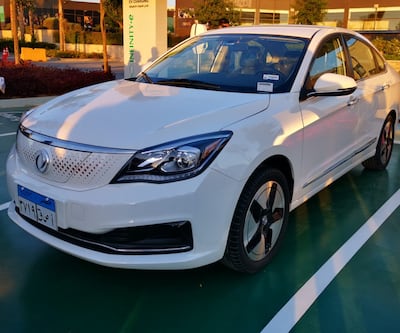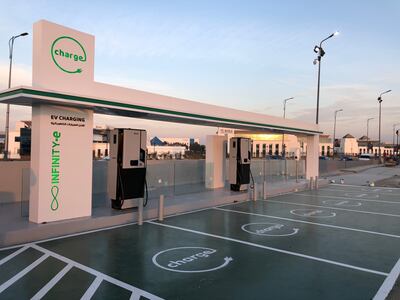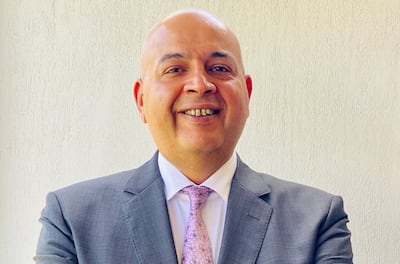A common sight on the congested roads of Cairo is black smoke billowing from the exhaust pipes of rundown minibuses.
Spotting an electric car, on the other hand, is a rarity in Egypt. Industry professionals estimate there are 1,000 to 1,800 electric cars on the road in a country with a population of 100.4 million.
But now the country is proactively taking steps to make transport more sustainable as authorities tackle the issue of air pollution, with the Egyptian government and the private sector stepping up investments.
El Nasr Automotive chief executive
The country plans to manufacture E70 electric cars locally starting in mid-2022 through a deal between the state-owned El Nasr Automotive Manufacturing Company and China’s Dongfeng Motor Corporation, with the support of the Ministry of Public Enterprise.
Private sector players, such as Infinity EV and the National Automotive Company (Natco), plan to increase the number of charging stations from fewer than 100 to several thousand within the next three years as they provide supporting infrastructure necessary for EVs.
“Is Egypt ready now? Of course not. But this all needs to happen simultaneously. It can’t be the production first or the chargers first,” Hany El Kholy, chief executive of El Nasr Automotive told The National.
“By educating people of the benefits of electric cars and preparing the infrastructure ... that’s when people will start buying them."
Major car makers have announced plans for a complete shift to electric vehicles, including Jaguar by 2025, and Mercedes-Benz and Volvo by 2030.
“The EV future is coming very soon,” Yasser Saleh, Natco's chief executive told The National. “It’s time to start. There is always a first time and always a first step.”
Reducing air pollution and climate pollutant emissions are a part of Egypt’s Vision 2030, in line with the UN's 17 Sustainable Development Goals.
President Abdel Fattah El Sisi has championed a transition to a green economy and Egypt has been nominated to host the UN Cop27 conference in 2022.
Fifteen per cent of the country's 2021 national investment plan consists of green projects and by 2024, that will increase to 50 per cent, the Ministry of Environment said.

Two years ago, the government decided to revive production at El Nasr, which was established in 1960 but shut down operations in 2009.
“The idea was to produce electric cars in line with the president’s green initiatives,” Mr El Kholy said.
In January, El Nasr signed two contracts with Dongfeng to rehabilitate its factory at a cost of 2.5 billion Egyptian pounds ($159.4m) and assemble the Nasr E70 electric car locally.
The company imported 13 E70 cars from China and started testing them on the road in August with drivers from Uber, which has committed to going fully electric by 2040.
El Nasr expects to produce 25,000 vehicles in 2022 – a total of 15,000 for ride-hailing providers and taxis, and 10,000 for government fleets and individual users – starting by using 50 per cent local components.
Production could increase to 53,000 cars within three years, moving to 100 per cent local components.
Pricing will range from 300,000 pounds to 400,000 pounds and the government is offering 50,000 pounds as a subsidy for the first 100,000 customers.

The government plans to create 1,000 electric charging stations this year and another 3,000 in 2022.
Currently, only Infinity EV provides electric chargers in the country.
“We sensed that if we start early, we’d have the edge to secure all the real estate that’s needed,” Shams Abdel Ghaffar, managing director of Infinity EV said.
There are 70 stations with 210 charging points in Greater Cairo, Alexandria, El Alamein, Ismailia, Hurghada and Sharm El Sheikh, and along major highways.
Infinity EV is in discussions with the government to help build an EV-charging network with as many as 6,000 charging points in the next three years, Mr Abdel Ghaffar said.
The company has been providing the service free but an approved tariff will soon be announced by the Egyptian Cabinet, ranging from 1.69 pounds per kilowatt hour to 3.75 pounds for fast charging on the major highways.

Natco, which has been Daimler’s partner for Mercedes-Benz in Egypt for decades, said it would start assembling electric chargers, establishing charging stations and distributing electrical vehicles in its showrooms.
The company last month said it plans a bond issuance of 1bn pounds, of which 60 per cent to 65 per cent will be green bonds.
“We are planning to introduce the EV culture, product and concept to the Egyptian market in co-ordination with the local and global changes that are taking place in the automotive industry,” Mr Saleh of Natco said.
The move is “one step on the road” to becoming more environmentally friendly and customer-centric as the company considers an initial public offering in the next two years, he said.
Mr Saleh did not specify how many charging stations Natco would build, but said “in a timeframe of 12 to 24 months, normal consumers will start to see and feel the availability of charging stations everywhere”.
The only original equipment manufacturers selling EVs in the Egyptian market now are BMW, Hyundai and Porsche, Mr Abdel Ghaffar said.
Otherwise, traders import electric cars from the US and Europe and “sell them here for a premium”, he said.
In countries such as Norway, which has the world’s highest number of EVs per capita, government incentives make the option cheaper.
The Egyptian government is following suit by providing a customs exemption and offering a cheaper alternative with its locally produced model.
Electrified, a one-stop platform for electric mobility connecting users and services, is selling used cars ranging in price from a 2015 Fiat 500e at 230,000 pounds to a 2020 Tesla Model S at 1.8m pounds.
New electric cars range from a 2019 Volkswagen e-Lavida for 390,000 pounds to a 2020 Tesla Model 3 for 925,000 pounds.
However, Electrified founder Ayman Mohamed says the prices are comparable to gasoline-powered cars in Egypt, which also sell at a premium.
“If I’m going to buy a BMW for 1m Egyptian pounds, I can buy a Tesla,” he said.
In the long term, consumers will save money, spending approximately 20 per cent of the operating costs of a normal car and zero maintenance.
Mr Mohamed said he founded Electrified to help consumers on their EV journey, starting informally through social media in 2018 and formally last year.
The Electrified community comprises around 300,000 consumers, with 70,000 to 80,000 “ready to convert” to electric cars once concerns such as finance, service centres and charging stations are resolved.


